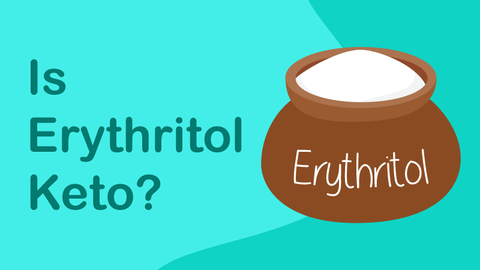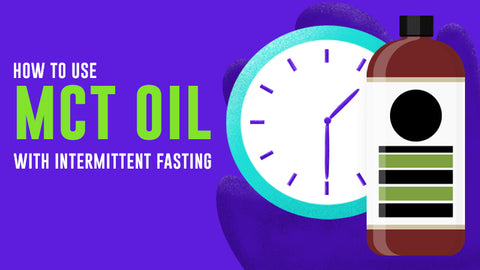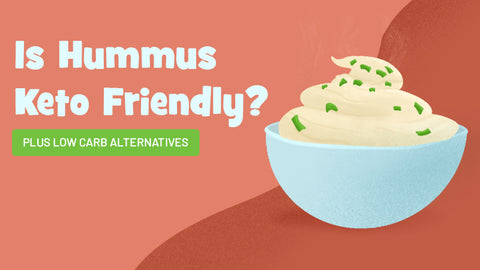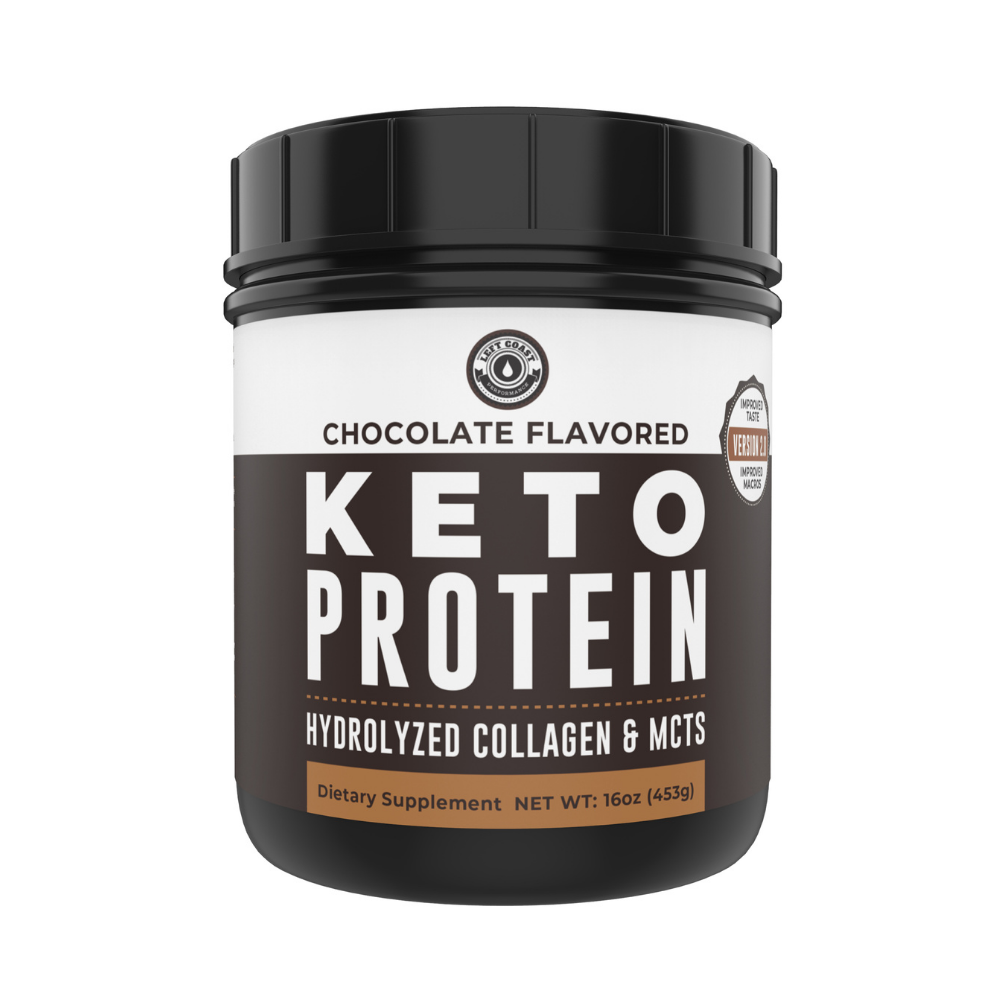Keto Versus Low Carb: What’s the Difference?

on July 25, 2019
The ketogenic (keto) diet is a type of low carb diet. But, a low carb diet is not necessarily a keto diet. So, what is the difference between them?
What is considered low carb?
To understand what “low carb” is, first we need to understand the definition of regular carb. The Institute of Medicine (IOM) has established that the Recommended Dietary Allowance (RDA) for carbohydrates is 130 grams per day for children and adults.
The IOM also established another number, called the Accepted Macronutrient Distribution Range (AMDR) that recommends the amount of carbohydrates as a percentage of calories. The AMDR for carbohydrates is 45-65% of calories. This would mean a person who eats 2000 calories per day should eat between 225-335 grams of carbs per day. The AMDR is higher than the RDA because they want to allow for enough carbohydrate intake to meet daily fiber needs.
All that being said, there is no agreed upon definition of a low carb diet. In theory, anything below the numbers discussed above could be considered low carb, since it is below what the IOM recommends.
How Many Carbs For A Low Carb Diet?
A low carb diet for one person, may not be the same as a low carb diet for another. People have variable carb tolerance. Someone who is young and physically active may be able to eat more carbohydrates with no ill effects, whereas an older, inactive person may gain weight with the same amount.
But, to provide some simple guidance, low carbohydrate diets can be broken down into three general carb levels:
Keto Low Carb
Anything below 50 grams of carbohydrates per day is considered very low carb or at a ketogenic level. But, the amount of carbs that puts someone into ketosis can vary. Some people may be able to get into ketosis at a higher carbohydrate level, while some need to stick to even lower amounts.
Moderate Low Carb
Between 50-130 grams of carbohydrates per day is considered a moderate low carb diet. For most people, this will not cause ketosis, but may still promote weight loss.
Liberal Low Carb
Liberal low carb is between 130-200 grams of carbohydrates per day. This is lower than most people eat on the standard American diet, but will probably be the easiest to stick with long-term since most foods will be allowed.
Low Carb without Ketosis
Moderate or liberal low carb diets focus on eliminating the main sources of carbohydrates. For most people, when they cut out grains, sugar, candy and sweetened beverages, they end up eating a lower carbohydrate diet without much effort. These foods are also easy to overeat. So simply eliminating these types of foods may lead to weight loss due to eating fewer calories.
Depending on the type of diet, a low carbohydrate diet may also eliminate certain dairy products and fruit. This would bring down the carb count even further.
Simply cutting back on foods that contain carbohydrates will generally not put you into ketosis, unless you significantly restrict carbs. Ketosis is a metabolic state where the body shifts from burning carbs as a primary fuel source and starts to burn fat instead.
That being said, depending on your goals, age, and metabolism a low carb diet without ketosis can still have many health benefits and help with weight loss.
How Many Carbs To Stay In Ketosis?
The goal of the keto diet is get the body to switch to using fat for fuel, instead of glucose. This only occurs when there is severe carbohydrate restriction. Most keto diets recommend not eating more than 10% of calories from carbohydrates. For most people, this translates to eating between 20-50 grams of net carbs per day to maintain a state of ketosis.
What Are Net Carbs?
The keto diet recommends an intake of a certain number of “net” carbs. On food labels and in the nutritional analysis of various foods, there are two carbohydrates that are counted in the “total carb” number that can’t actually be digested or used by humans, these two are fiber and sugar alcohol.
Humans do not have the enzymes to breakdown fiber for calories. It passes through the digestive system pretty much intact. Sugar alcohols act similarly to fiber. These two carbs do not impact blood sugar or ketosis, therefore they can be subtracted from the total carb number.
How To Calculate Net Carbs
To figure out the “net” carbs in a food, first take the total carbohydrates then subtract the fiber or sugar alcohols (be careful, some sugar alcohols do spike blood sugar and will kick you out of ketosis) to get the actual carbs that you need to worry about if you are counting your carbs.
Here is an example with avocado, which is high in carbs.
Total carbs in a medium avocado: 17 grams
Fiber: 13 grams
NET carbs: 17-13 = 4 grams
If you are following a keto diet, calculating net carbs allows you to eat a greater variety of healthy, high fiber foods, especially vegetables.
Sugar Alcohols Net Carbs
Sugar alcohols are food additives that are designed to provide a sweet taste to foods. They are different than non-nutritive sweeteners like aspartame or sucralose because they do provide calories. Common sugar alcohols include:
- Xylitol
- Erythritol
- Isomalt
- Matlitol
- Sorbitol
Sugar alcohols are processed similarly to fiber and can be subtracted from the “total carbs” on a food label in the same way.
But, they are not all “free” in the same way as fiber is and can vary on how they impact your blood sugar and insulin levels. Sugar alcohols are only partially absorbed in the small intestine. The amount that is absorbed depends on the type of sugar alcohol. We formulate recipes only using erythritol because studies have shown that it has little to no impact on blood sugar.
They are also quickly excreted.
The variation in absorption means they will have varying effects on your blood sugar and insulin levels. It is hard to know exactly how your body will process the sugar alcohol and how it will impact ketosis. In some people, they still can increase blood sugar.
Since they are not completely absorbed in the small intestine they can also cause gas, bloating, and diarrhea if consumed in large quantities. Although sugar alcohols might be helpful when on keto, allowing you to eat a larger variety of foods, it's important to not overdo it.
Low Carb Benefits
A low carbohydrate diet has many potential health benefits. Many people first try a low carb diet because they are interested in weight loss. Research does show that it is quite effective for promoting weight loss, more than the usual low calorie or low fat diets. It helps suppress hunger, which makes sticking to a calorie-controlled diet easier.
Other potential benefits of low carb diets include:
- Lower triglycerides
- Increased HDL “good” cholesterol
- Improved glucose and insulin levels
- Protective of the brain and degenerative diseases
A standard low-carbohydrate diet also allows for a focus on whole food nutrition. Eliminating processed grains and sugar is the first step towards a low-carb diet and one of the healthiest changes you can make to your diet. This allows for an increased intake of protein, vegetables, fruit, and healthy fats, which provide the nutrients you need for true health.
Ketosis Benefits
The ketogenic diet has many health benefits as well. The first benefit, which gets most people interested in keto is that it promotes weight loss.
The body has almost an unlimited amount of calories stored as fat. Being able to tap into those calories helps the body use up all that stored fat, leading to weight loss. But, the keto diet also suppresses appetite. Increased fat and protein intake with the keto diet and certain hormonal shifts that occur make calorie restriction easier.
But, there are many benefits beyond just weight loss. Ketogenic diets have been used to manage certain medical conditions, such as:
Further research is needed to determine the optimal carbohydrate range and how to best use the keto diet for these conditions.
Low Carb Vs Keto For Weight Loss
You can lose weight on both a keto or a low carbohydrate diet. With a low carb diet, simply eliminating grains and sugar, makes it easy to cut calories, which may result in weight loss.
But, the ketogenic diet may help you lose weight faster. Two hormones related to appetite, ghrelin and CCK, help significantly decrease hunger on the keto diet making weight loss easier.
A 2008 study compared the two diets for weight loss. Seventeen subjects followed either a keto diet (4% of calories from carbs) or a low carb diet (35% of calories from carbs). Calorie intake was not restricted in any of the subjects. Those who ate fewer carbs effortlessly ate 300 fewer calories per day, reported less hunger, and lost more weight.
Although this is one small study, it does suggest that the appetite suppressing power of keto may translate to faster weight loss.
What Diet Is Right For You?
The “best” diet depends on your individual needs. Here are a few things to consider when making your decision:
- A keto diet must be strictly followed or you will get kicked out of ketosis.
- A low carbohydrate diet is more flexible.
- A keto diet will usually result in faster weight loss and helps suppress appetite.
- A low carbohydrate may not suppress appetite as much, since there is no hormonal shift.
- People report improved energy and mental performance with keto.
- Both can help improve blood sugar and insulin resistance, although keto may be more effective.
- Depending on the composition of your diet, keto may not provide adequate fiber and too much fat to keep gut bacteria happy. This can lead to long-term digestive problems.
- A keto diet may not meet 100% of the vitamin and mineral needs for all people. A low-carb diet allows for the addition of more fruits and vegetables, which nutritionally may be a more balanced approach.
So, which should you choose? If you are generally healthy and don’t need to lose weight, consider a low carb diet. It will provide many of the health benefits of eating fewer carbs, while allowing some flexibility. Basing your diet in quality protein, healthy fats, vegetables, and some fruit provides all the nutrients you need and supports your health.
A 2018 study in Lancet found that low carbohydrate diets increased the risk of mortality, if the diet consisted of large amounts of animal foods. But, if the diet was low carb, yet based more in plant foods, there was no such risk. This suggests that for long-term health a more moderate low carbohydrate approach with a higher intake of fruits and vegetables, may be beneficial.
At the same time, being obese is also not good for overall health. If you need to lose a significant amount of weight, you may want to consider keto for a period of time. Eating strict keto is likely not realistic long-term, but can give you the jump start you need to lose weight and get healthier. Even just losing 5-10% of your current body weight can reduce your risk for chronic disease.
You may then want to gradually transition to a low carb diet by slowly adding back carbs, especially in the form of fruits and vegetables, until your weight stabilizes.
All this being said, the “right” diet depends on the individual. Any diet that is too complicated or restrictive will be impossible to stick with long-term. The goal with choosing any way of eating is not to jump from diet to diet. You should try to find a diet that is both healthy and sustainable for you. To find the best diet for you, consider consulting with a trained professional who can assess your entire lifestyle and help you make an informed decision.















